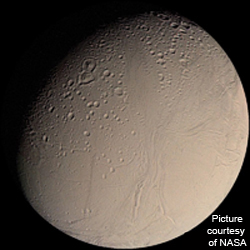Creation and secular scientists were fascinated by the discovery of possible geysers of water on the moon of Saturn, Enceladus, by the Cassini spacecraft on  March 9th.
March 9th.
CNN.com states that because water might be present, there is a "tantalizing possibility" that life might also be found (CNN.com 2006). Although creation scientists are as excited as their secular counterparts, there is no scientific reason to equate water with life. This is an unjustified stretch.
Although water is an integral part of virtually all life, liquid water does not equal life. Several years ago, Stephen C. Meyer wrote a detailed description of the numerous problems associated with the spontaneous origin of life on this planet—the hospitable environment of Earth [Meyer 1996]. Three years later evolutionist Trevor Palmer of Nottingham Trent University admitted, "At the present time, we are still a long way from a proper detailed explanation for the origin of life on Earth" [Palmer 1999].
In 2002, evolutionist A.G. Fisher stated, "Both the origin of life and the origin of the major groups of animals remain unknown" [Fisher 2002].
If secular scientists continue to draw biochemical blanks regarding a purely materialistic explanation for life evolving on Earth, then why should they become excited regarding merely the presence of liquid water on an inhospitable moon?
As with any amazing discovery, significant caution should be exercised. CNN.com quotes one senior scientist as saying in regard to potential life on this tiny moon: "It's certainly interesting, but I don't see how much more you can say beyond that" (CNN.com 2006). Life as we know it is so extremely complex, that even the phrase "simple life" is an oxymoron.
The fundamental law of biology seems to be still firmly in effect--life only comes from life.
References
- AP. 2006. Scientists: Liquid water erupting on Saturn moon. CNN.com. March 9, 2006. http://ap.org/
- Meyer, S.C. 1996. The Origin of Life and the Death of Materialism. The Intercollegiate Review, vol 31, #2.
- Palmer, T. 1999. Controversy: Catastrophism & Evolution. New York: Kluwer Academic.
- Fisher, A.G. Fossil. Grolier Multimedia Encyclopedia. Scholastic Library, 1996. CD-ROM.

















